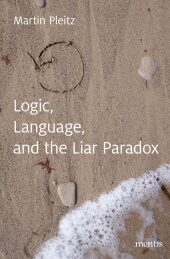 Neuerscheinungen 2018Stand: 2020-02-01 |
Schnellsuche
ISBN/Stichwort/Autor
|
Herderstraße 10
10625 Berlin
Tel.: 030 315 714 16
Fax 030 315 714 14
info@buchspektrum.de |

Martin Pleitz
Language, Logic, and the Liar-Paradox
2018. 651 S. 233 x 157 mm
Verlag/Jahr: MENTIS-VERLAG 2018
ISBN: 3-9574303-4-8 (3957430348)
Neue ISBN: 978-3-9574303-4-2 (9783957430342)
Preis und Lieferzeit: Bitte klicken
The Liar paradox arises when we consider a sentence that says of itself that it is not true. If such self-referential sentences exist - and examples like "This sentence is not true" certainly suggest this -, then our logic and standard notion of truth allow to infer a contradiction: The Liar sentence is true and not true. What has gone wrong? Must we revise our notion of truth and our logic? Or can we dispel the common conviction that there are such self-referential sentences? The present study explores the second path. After comparing the Liar reasoning in formal and informal logic and showing that there are no Gödelian Liar sentences, the study moves on from the semantics of self-reference to the metaphysics of expressions and proposes a novel solution to the Liar paradox: Meaningful expressions are distinct from their syntactic bases and exist only relative to contexts. Detailed semantico-metaphysical arguments show that in this dynamic setting, an object can be referred to only after it has started to exist. Hence the circular reference needed in the Liar paradox cannot occur, after all. As this solution is contextualist, it evades the expressibility problems of other proposals.
Martin Pleitz, geb. 1972, studierte in Freiburg und Münster Philosophie, Soziologie und Mathematik und ist derzeit wissenschaftlicher Mitarbeiter am Lehrstuhl für Logik und Sprachphilosophie in Münster. Er arbeitet in den Bereichen der philosophischen Logik, Metaphysik, Zeichentheorie, Sprachphilosophie und Philosophie der Mathematik. Sein besonderes Interesse gilt seit langem der Zeitphilosophie (im Stil Arthur Priors), und den semantischen und mengentheoretischen Paradoxien. Ausgehend von seiner (mit dem Universitätspreis 2012 der Universität Münster ausgezeichneten) Dissertation hat er eine zeitphilosophisch inspirierte Lösung der Lügnerparadoxie entwickelt. Derzeit untersucht er die Rolle von Reifikation in der Konstitution abstrakter Gegenstände.


